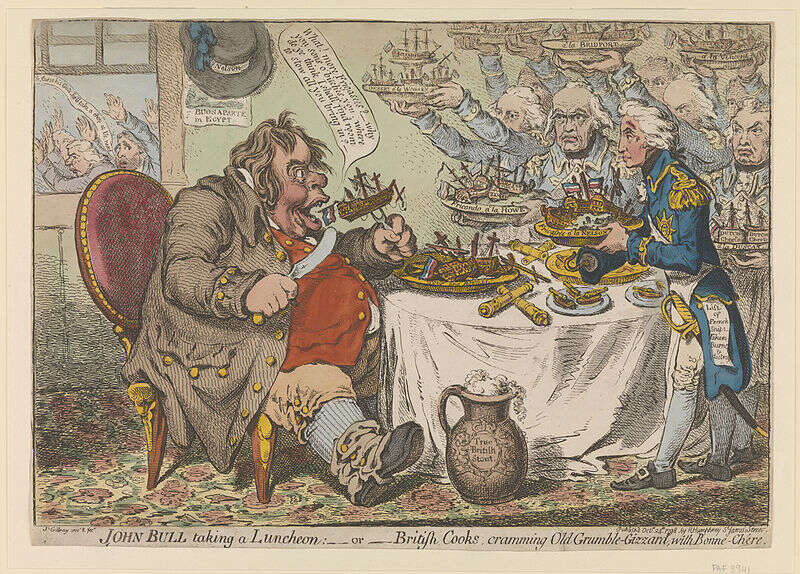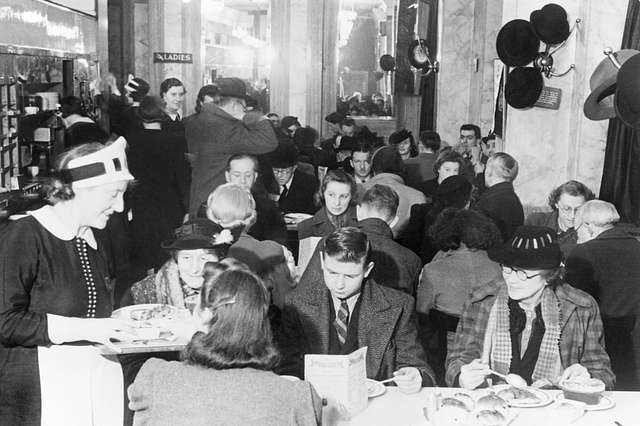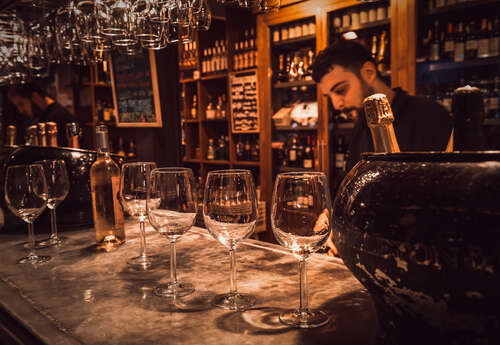
Stuart Walton examines the culture of alcoholic excess in Late Georgian England, when heavy drinking was considered a manly British virtue.
“Man, being reasonable, must get drunk; / The best of life is but intoxication,” wrote Byron in his verse epic Don Juan (1819-24). “Few things surpass old wine” The sap of drunkenness is what encourages the tree of life to put forth luxuriant foliage, and only a desiccated sermon-lover would spurn advice that hardly needs dressing in poetic metaphor: “Get very drunk.” Yes, he admits, you will likely wake with a godawful headache the next morning, but the remedy to that is at hand. Those still in search today of the infallible hangover cure, listen up. “Ring for your valet—bid him quickly bring / Some hock and soda-water.” And there you have it. The antidote to last night’s three bottles of Port is a bracing spritzer, served in bed by the help.
Tumultuous era
While the principal literary mode of Don Juan is unmistakably satirical, nobody need run away with the idea that George Gordon, Lord Byron, was making fun of those who enjoyed a drink. His own consumption habits were an extended demonstration of the efficacy of the Don’s advice, and nor was he, despite his obvious class privilege and elastically flexible approach to personal morality, a maverick in the bibulous English annals. His own scorn for limits perfectly reflected the tumultuous era in which his short life was lived.
The fascination of alcohol historians with what became known as the gin plague in England, in the 1730s and 1740s, has often tended to overlook the fact that gargantuan drinking remained the diurnal habit of the middling and upper classes in the late Georgian period, even after the labourers had been weaned back on to beer. Drinking was the continual resort of the man of affairs throughout his waking hours. Sherry at breakfast girded his loins against the day’s exigencies, which the midday draught helped punctuate. The evening might bring a formal dinner accompanied by sumptuous wines, which was worth preparing for with a bottle or two beforehand, but even a quiet supper at home was copiously supplied. At the close of proceedings, while the ladies withdrew for tea, the serious business could at last begin.
Drinking Port as a patriotic duty
The wine of choice was Port, a category that covered a multitude of different styles. Some of it was rough-and-ready Douro table wine, some of it not even Portuguese, but the greater part was the product more or less recognisable today—potent red wine fortified not with neutral spirit but with brandy. Its sale lavishly promoted by preferential tariffs for the products of Portugal, as against those of martial England’s perpetual nemesis, Bourbon France, it symbolised not only the patriotic duty of the free-born Englishman, but an avowal of his social and cultural autonomy too. Not for John Bull the effete discriminacy of the French. He could distinguish a fine wine from noxious slop with the best of them, but in the matter of their effects, which hardly differed from each other, his manly resilience to inebriety was the talk of the continental mainland.
Isaac Cruikshank, father of the celebrated caricaturist George, and himself a satirical illustrator of the enormities of late Georgian manners, died at 55 of alcohol toxicity following a drinking contest, of which he was declared the undisputed winner, only his final coma preventing him from receiving the plaudits of witnesses. The proceedings of the House of Commons were typically conducted amid the ululations of the squiffed, or else in the compromised state of William Pitt the Younger, who frankly told his opponent Charles James Fox in March 1787 that he was unable to address himself to the right honorable gentleman’s questions on the grounds that he was “so much oppressed by indisposition” (biliously hung over). Actors on the Covent Garden stage habitually bumbled their way through their lines to the best approximation that a befuddled memory could supply.
Cataclysmically smashed
The permanent paradigm of the era was the Prince of Wales, the future George IV, whose personal conduct made the indelicacies of today’s media stars look feebly unimaginative. At his marriage to Caroline of Brunswick in 1795, the cataclysmically smashed bridegroom had had to be held upright by two of his brothers. It probably seemed the only way to get through a wedding to a woman he had only just met, a first cousin whom he despised to the extent of physical revulsion, when only the cursed Royal Marriages Act prevented recognition of the wife, Maria Fitzherbert, he had married a decade earlier. On the wedding night, he somehow blundered through the sexual act with Caroline, a heroic feat to which their only daughter would be living testimony, before keeling over into the fireplace, where the bride happily abandoned him for the night.
Public opinion may decisively have sided with Queen Caroline when the royal couple were estranged a mere year after their marriage, but George’s antics were seen by the cartoonists as exemplary for their bloody-minded libertarian individualism, at once fashionable and uproariously funny. It would take the onset of Victorian decorum to put a period to Georgian excess, but whether it went meekly to its grave forever is another question.






